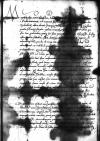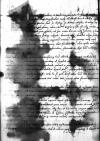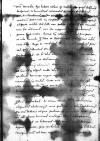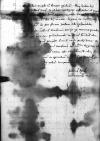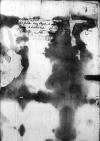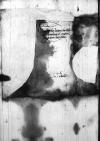List #292
Piotr TOMICKI do Ioannes DANTISCUSGdańsk (Danzig), 1526-07-05
| odebrano Granada, [1526]-11-14 Rękopiśmienne podstawy źródłowe:
Pomocnicze podstawy źródłowe:
| ||||||||||
Tekst + aparat krytyczny + komentarz Zwykły tekst Tekst + komentarz Tekst + aparat krytyczny Ekscerpty dotyczące podróży Dantyszka
Magnifico domino
Magnifice domine, amice carissime, salutem.
Dum hic in[...] paper damaged⌈[...][...] paper damaged⌉ris [...] paper damaged⌈[...][...] paper damaged⌉s[...] paper damaged⌈[...][...] paper damaged⌉s, ternae, si recte meminimus, a te venerunt
De perturbatione status rerum  BCz, 247, p. 50
[...] paper damaged⌈[...][...] paper damaged⌉dicata,
BCz, 247, p. 50
[...] paper damaged⌈[...][...] paper damaged⌉dicata,
Quantum ad provisionem tuam attinet, non ignoras iam dudum tibi designatum esse, quantum ad singulos menses habere debeas et si tibi aliquando non suppet<i>erit, poteris a mensariis mutuari, solvetur enim totum, nec dubites
Nobiscum satis, Deo gratia, pacata sunt omnia ab externis, tamen reliqui finitimi Luterana labe imbuti, ne quicquam perturbationis pariant, verendum est.
Res sororis tuae, quas nobis posterioribus litteris tuis commendasti, erunt nobis curae. Sed et cetera quodque tuae dignitati et commodis tuis
 BCz, 247, p. 55
profutura est [...] paper damaged⌈[...][...] paper damaged⌉ra[...] paper damaged⌈[...][...] paper damaged⌉ hac paper damaged⌈[hac]hac paper damaged⌉temus [...] paper damaged⌈[...][...] paper damaged⌉ saepius ad nos scribito nosque diligas et certo tibi persuadeas paper damaged⌈[s]s paper damaged⌉, quod paper damaged⌈[quod]quod paper damaged⌉ numquam deerimus honori et commodis tuis.
BCz, 247, p. 55
profutura est [...] paper damaged⌈[...][...] paper damaged⌉ra[...] paper damaged⌈[...][...] paper damaged⌉ hac paper damaged⌈[hac]hac paper damaged⌉temus [...] paper damaged⌈[...][...] paper damaged⌉ saepius ad nos scribito nosque diligas et certo tibi persuadeas paper damaged⌈[s]s paper damaged⌉, quod paper damaged⌈[quod]quod paper damaged⌉ numquam deerimus honori et commodis tuis.
Ex
Postscript:
Domine Dantisce.
Ego laboro adhuc ex oculis, per quos defluunt lacrimae et umiditas catarrhalis a capi paper damaged⌈[i]i paper damaged⌉te descendens. Adhibui hactenus multa remedia ab i[...] paper damaged⌈[...][...] paper damaged⌉a[...] paper damaged⌈[...][...] paper damaged⌉i etiam cauterium potentiale in occipitio et parte paper damaged⌈[te]te paper damaged⌉ posteriori capitis aliquot menses, sed sisti non potest flu paper damaged⌈[u]u paper damaged⌉xus. Qui tametsi non sit continuus nec ita magnus atque exuberans, prout fuit antea, durat tamen adhuc et plus tempore et caelo umido quam sicco et sereno apparere ac me infestare solet. Rogo te, consulas istic stain⌈[] stain⌉ medicos peritos, quomodo sistendus seu [...] paper damaged⌈[...][...] paper damaged⌉tem [...] paper damaged⌈[...][...] paper damaged⌉em fluxus lacrimalis, et si usus alicuius [...] stain⌈[...][...] stain⌉ pro confortando cerebro et desiccandis [...] stain⌈[...][...] stain⌉ eius aut etiam collyrii alicuius, conveniret diligenter inquiras. Ad hoc usque tempus nullo usus sum collyrio timens, ne exsistente umore noxio in capite, afferret aliquod nocumentum in oculis. Certo autem mihi persuadeo, quod istic sunt excellentissimi et peritissimi medici stain⌈[medici]medici stain⌉, qui poterint bene consulere et opem stain⌈[et opem]et opem stain⌉ ferre malo meo. Quam stain⌈[m]m stain⌉ agas cum illis et quid senserint aut consulerint, mihi quam primum perscribas. Si etiam utendum esse censuerint aliquibus electuariis aut quibuscumque aliis medicinis seu etiam collyrio aliquo probato et non nimium forti, quod non offenderet tunicas oculorum, illorum descriptionem mihi mittas et subarres illos aut aliquem illorum digno munere, quo consulat diligentius stain⌈[iligentius]iligentius stain⌉ et fidelius. Quicquid autem ad tam necessarium opus im stain⌈[opus im]opus im stain⌉penderis,
 BCz, 247, p. 52
id tibi hic amplo cum faenore exsolvam. Non habeo hic mecu paper damaged⌈[cu]cu paper damaged⌉m cifras tuas et ob hoc intelligere non potui id, quod in po paper damage⌈[po]po paper damage⌉stremis tuis litteris ad me in calce scripsisti. Veniens vero paper damaged⌈[o]o paper damaged⌉
BCz, 247, p. 52
id tibi hic amplo cum faenore exsolvam. Non habeo hic mecu paper damaged⌈[cu]cu paper damaged⌉m cifras tuas et ob hoc intelligere non potui id, quod in po paper damage⌈[po]po paper damage⌉stremis tuis litteris ad me in calce scripsisti. Veniens vero paper damaged⌈[o]o paper damaged⌉
